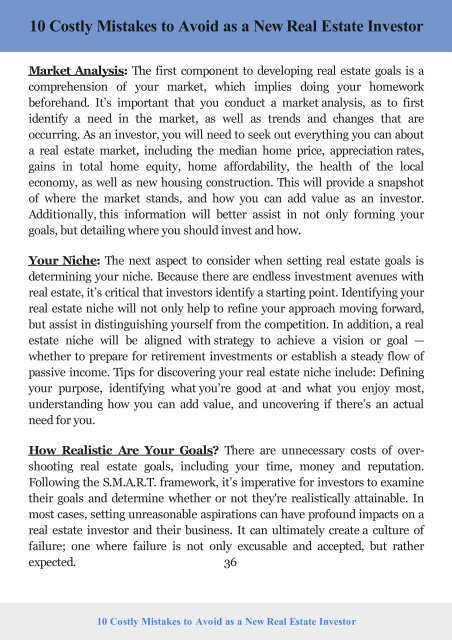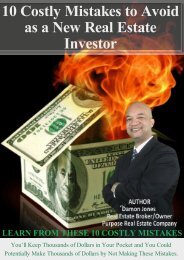ebook proof read april 27
You also want an ePaper? Increase the reach of your titles
YUMPU automatically turns print PDFs into web optimized ePapers that Google loves.
10 Costly Mistakes to Avoid as a New Real Estate Investor<br />
Market Analysis: The first component to developing real estate goals is a<br />
comprehension of your market, which implies doing your homework<br />
beforehand. It’s important that you conduct a market analysis, as to first<br />
identify a need in the market, as well as trends and changes that are<br />
occurring. As an investor, you will need to seek out everything you can about<br />
a real estate market, including the median home price, appreciation rates,<br />
gains in total home equity, home affordability, the health of the local<br />
economy, as well as new housing construction. This will provide a snapshot<br />
of where the market stands, and how you can add value as an investor.<br />
Additionally, this information will better assist in not only forming your<br />
goals, but detailing where you should invest and how.<br />
Your Niche: The next aspect to consider when setting real estate goals is<br />
determining your niche. Because there are endless investment avenues with<br />
real estate, it’s critical that investors identify a starting point. Identifying your<br />
real estate niche will not only help to refine your approach moving forward,<br />
but assist in distinguishing yourself from the competition. In addition, a real<br />
estate niche will be aligned with strategy to achieve a vision or goal —<br />
whether to prepare for retirement investments or establish a steady flow of<br />
passive income. Tips for discovering your real estate niche include: Defining<br />
your purpose, identifying what you’re good at and what you enjoy most,<br />
understanding how you can add value, and uncovering if there’s an actual<br />
need for you.<br />
How Realistic Are Your Goals? There are unnecessary costs of overshooting<br />
real estate goals, including your time, money and reputation.<br />
Following the S.M.A.R.T. framework, it’s imperative for investors to examine<br />
their goals and determine whether or not they're realistically attainable. In<br />
most cases, setting unreasonable aspirations can have profound impacts on a<br />
real estate investor and their business. It can ultimately create a culture of<br />
failure; one where failure is not only excusable and accepted, but rather<br />
expected. 36<br />
10 Costly Mistakes to Avoid as a New Real Estate Investor



